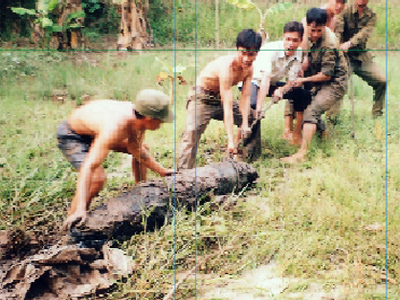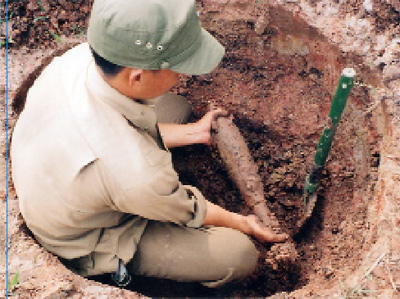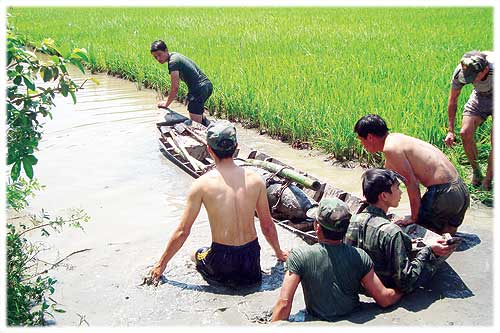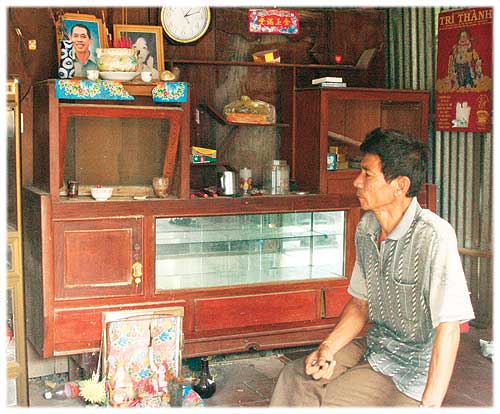
That old man was Mr. Tran Van Minh who had been living in uncertainty for a time, since he unearthed a big bomb on his field. The bomb emerged on the surface, with a steel wire with it.
The news about the bomb spread very quickly. The road along Duoi Chuot canal, which is adjacent to Minh’s field, suddenly became a dangerous spot. Anyone who saw the bomb was scare of it. Some daring men volunteered to take the bomb to cast it to a nearby river but Minh did not agree. Minh and his family became reluctant “bomb” guards.
The ghost of war
It is not a big surprise for people in the southwestern region to see bombs. They can discover a bomb when they grow rice, dig soil, exploit sand, and even when they cook. Bombs that left from wars are still big threats.
Lieutenant colonel Dang Anh Dung, Deputy chief of staff of Engineer Brigade 25 of Military Zone 9, said that there is no official statistics of bombs, mines, explosive and toxic chemicals left by war. Soldiers of Engineer Brigade 25 have disposed many bombs detected by people. They are also requested to search and deactivate bombs and mines for many construction projects. Dung called hidden bombs and mines “ghosts of war.”
A group of journalists were permitted to join a trip of a bomb disposal squad led by Lieutenant colonel Dung to Dong Thap province. Earlier, the Engineer Brigade 25 received reports of four big bombs in Dong Thap. These bombs are said to be able to level an area which is as large as a football ground. One day ago, soldiers of the Engineer Brigade 25 removed three big bombs in Dong Thap.
Returning to Duoi Chuot Canal and the field of farmer Tran Van Minh, journalists saw a bomb of 80cm long, 30cm in diameter and nearly 50kg in weight. Buried for many years, the bomb looked strange. Seeing the bomb, Lieutenant colonel Dung said this bomb has two fuses. He said the outward layer was decomposed but the bomb still worked.

All followers were requested to keep off from the spot. Senior lieutenant Nguyen Van Hung approached and considered how to remove the bomb. He paid special attention to the steel wire. At the guidance of Lieutenant colonel Dung, sappers began the tensest and most dangerous task.
Two sappers gently slap their hands under the bomb. They lifted the side with the fuse, passed through a rope and knotted it. One, two, three… the bomb was raised from the ground. The “death” was carried by the shoulders of two sappers.
All people held their breath to follow each step of the two soldiers. The road from the site where the bomb was excavated to the wharf, where the bomb would be carried away by a boat, is only 20m but it seemed to be very long. That was the feeling of those who are at safe distance. How is the feeling of sappers?
The Engineer Brigade 25 is specialized in collecting and dealing with bombs and mines left from wars in 13 provinces in the Mekong Delta. The brigade’s soldiers appear at any place where bombs, mines and explosives are detected.
Engineer soldiers do not like telling stories about defusing bombs and mines. It is only known that in hand-in-hand combats against the death, they are in most dangerous situations. Many young soldiers train themselves and overcome the fear to fulfill their dangerous missions by experience of their seniors.
Till the end of challenge

In the morning of a year-end day, Lieutenant colonel Le Van Binh was on a south-north train when he received a phone call from Captain Vu Nhu Quynh, his assistant from the southern province of Tien Giang. Quynh reported that a sand explorer discovered a very big bomb in Go Cong Dong. Quynh visited the site and found ount a very strange item that he had never seen in his life. The item was around 1m long and 50cm wide. It looked like a fish-sauce jar.
Lieutenant colonel Le Van Binh asked Captain Quynh to describe the object in details. He gave many questions: “Does it have a piece of steel which looks like a glass on one head?”. “Does it have hexagonal bolts?” “Is there any wire on its body?”
Through Captain Quynh’s description, Lieutenant colonel Binh defined that this was a bomb of around 200kg, which is very powerful. He told Quynh to be very careful with the piece of steel which looks like a glass on a head of the bomb. Around one hour later, Quynh called again to tell him that the bomb was defused and removed from the residential area, in the happiness of local people.
Captain Quynh, from the army section of Tien Giang province, was modest about his dangerous job. He said there is nothing to remember about this job. When approaching a bomb, sappers only concentrate their mind on that deadly item. At that moment, the earth only revolves around that bomb.
Lieutenant colonel Dang Anh Dung said that in this job, sappers do not have any chance to correct mistake or learnt experience for the next time. Besides braveness, sappers must understand characteristics of each kind of bomb, concentrate highly on the task and have extremely accurate moves.
Lieutenant colonel Dao Nguyen Dan, chief of the bomb and mine collecting squad of Engineer Brigade 25, said that in fact, there are many dangerous circumstances for sappers.

Le Van Binh, head of the engineer corp of Tien Giang province, a former sapper of Engineer Brigade 25, said sadly: “Yesterday, a rubbish collector in Tan Phuoc (Tien Giang) picked up a phosphorus bomb. The bomb blazed up and killed that man.”
According to Binh, many people are still killed by bombs and mines in the peacetime. A fisherman unexpectedly picked up a phosphorus bomb. When he lifted the bomb out of water, it exploded. At a wedding party, people unluckily did the cooking on a plot of land, where had a bomb. When the soil was heat up, the bomb exploded, killing one person.
In the peacetime, people still find giant bombs. Last year, people in Vam Lang, Tien Giang province, discovered a bomb of up to 600kg under a 2m deep water. Lieutenant colonel Binh was the one who instructed sappers to defuse the big bomb. Seeing the bomb, Binh immediately knew that it had an electronic fuse, which is very dangerous. It took sappers up to two days to deactivate the bomb.
Binh said that chemical bombs are small but very dangerous because they explode very easily. To “control” this kind of bomb, experienced sappers have their own methods.
Untrained bomb disposal experts

Nguyen Van Cuong in front of the altar of his brother, Nguyen Van Hai, who was dead
while defusing a bomb two years ago.
Cuong, a fishman, has traveled many southern provinces with sappers of the Engineer Brigade 25 to dispose bombs. He said these trips were hard and dangerous but his life is more meaningful with them.
Cuong’s knowledge of bombs and mines was taught by his late brother, an expert of American bombs, who died of bomb. Nguyen Van Hai, Cuong’s elder brother, was licensed to defuse bombs in Tri Ton. Cuong followed Hai to collect hundreds of bombs in his hometown.
“We collected over 20 bombs in a cave in Tuc Dup hill. The smallest bomb was around 100kg and the largest is up to 300kg,” Cuong recalled.
The untrained bomb disposal worker Nguyen Van Hai became well-known. He was invited to defuse bombs in other southern provinces like Tien Giang, Kien Giang, Can Tho, Dong Thap, Ben Tre, etc. For Hai, this special job is not only to earn his living but responsibility.
Other members in Hai’s family also have certain knowledge about bombs and worked as assistants to Hai. One day, Hai received bad news. His apprentice was dead while defusing a mortal shell. The mortal shell exploded on his hands. Hai’s wife was also dead because she was standing near that man.
The tragedy turned Hai into a lost soul. To be pity for his brother, Cuong followed him and reluctantly became a student of Hai.
Hai told Cuong how to classify bombs, their destruction, and principle of explosion and how to defuse them. When his children could name many types of bombs, Cuong began working as a bomb disposal worker, the job the he had never thought of before.
“At the beginning, I dared not to approach to bombs. The more I knew about them, the more I felt scare of them,” Cuong recalled.
When he was no longer afraid of bombs, it turns: “I defuse bombs every day. I have no time to fear. It will be dangerous for me if I fear them.”
However, he was still cold with fear when he recalled the time he defused a 250kg bomb in Kien Giang province.
Normaly, a fuse is only deactivated when it is split from the bomb. However, as the bomb was stuck in a small cave, Hai and Cuong had to defuse the bomb on the spot.
Lieutenant colonel Tran Van Cuong from the army unit of Dong Thap province said Cuong’s brother – Nguyen Van Hai – died during a trip to defuse nine bombs in Tra Vinh and four bombs in Dong Thap with sappers. After splitting the fuse of the last bomb in Dong Thap, Hai deactivated the fuse. An explosion suddenly occurred, killing him on the spot.
Lieutenant colonel Le Van Binh, based on his experience, said that the bomb that killed Hai had automatic fuse.
The accident happened over two years ago but Cuong was still hurt. “That time I was busy at building the house for my mother. If I went there with Hai, with adequate tools, my brother would have not died,” he said.
After Hai’s death, Cuong went to Soc Trang and Ben Tre to defuse 9-10 bombs and returned home to work as a fisherman with his wife.
Thanh Nien